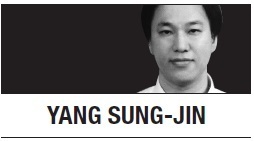It is now pretty common in Seoul to see couples sitting in Starbucks, tapping away on their own smartphones. They talk with each other, yet their eyes are often fixed on their handsets, not their loved ones.
 The ubiquitous presence of smartphones in everyday life is reconfiguring the way people interact in both public and private places. Of course, the advent of desktop and laptop computers also dealt a number of changes to the pattern of life, but not so thoroughly and drastically as that of smartphones, with their wealth of apps and instant connectivity to the Internet.
The ubiquitous presence of smartphones in everyday life is reconfiguring the way people interact in both public and private places. Of course, the advent of desktop and laptop computers also dealt a number of changes to the pattern of life, but not so thoroughly and drastically as that of smartphones, with their wealth of apps and instant connectivity to the Internet.
Naturally (or bewilderingly), the rules of the game are changing in the media industry. It used to be a simple competition: Broadcasters and print media fought to provide better and more popular content to viewers and readers without worrying about the distribution channels through which their content was delivered. After all, Korean broadcasters and print media had long maintained a firm grip on their delivery channels in a way that fended off new entrants and potential competitors fairly successfully.
Such happy days are almost if not already gone. Smartphones are destroying the media value channels. The number of people watching TV regularly at home in their living rooms is plunging, for instance. People do not read print newspapers on the subway while commuting to school or work. In both cases, the culprit in the eyes of media is the smartphone.
But what about the statistics suggesting that Korean viewers still watch TV on conventional sets for an average of 3 hours and 30 minutes per day? One media expert told me that it’s a distortion stemming from the rapid aging in Korean society.
Korean women in their early 20s -- the favorite target consumer group for most advertisers -- watch TV at home for less than an hour. But those in their 70s tend to watch TV in a fixed place for nearly six hours, which disproportionately boosts the average viewership.
“It is a fact that Koreans in their 20s and 30s do not watch TV as often as they did in the past,” he said.
Another problem is the intensity of attention. People used to pay a high level of attention to their favorite TV programs. These days, people do not really focus on the programs on the small screen; instead, they check Facebook alerts and watch the “Top 10 Best Cat Videos of All Time!” with the YouTube app on their smartphones. Only when something truly interesting or shocking comes up on TV do they divert their attention to the programs, before quickly turning back to their smartphone screens.
The flip side of the phenomenon is that people are consuming a record amount of media content overall, when including digital outlets. But this is hardly encouraging, as the diversification of distribution channels and a plethora of digital devices make it more difficult and costly to keep consumers focused on a single TV program or news article for a meaningful period of time.
As digital distraction is affecting more people, attention is turning into one of the most coveted assets in the digital era. This is why Korean media firms are scrambling to overhaul their websites and present their content in an enticing interface.
For all these efforts, however, the road ahead is filled with treacherous patches for Korean media. Unlike foreign media giants, local newspapers and broadcasters are still focused on the domestic market, whose potential for growth is fairly limited.
The July issue of “Newspaper and Broadcasting,” a media industry magazine published by the Korea Press Foundation, rightly pointed out that Korean media firms are yet to map out a global strategy to overcome the current crisis generated by the mobile revolution.
Worse, people are unlikely to reverse their behavior patterns. More couples will keep silent in cafes and restaurants when preoccupied with their smartphones, and more viewers will keep pretending to watch TV while browsing the Internet on tablet computers.
By Yang Sung-jin
Yang Sung-jin is the digital content desk editor of The Korea Herald. He can be reached at insight@heraldcorp.com. ― Ed.
 The ubiquitous presence of smartphones in everyday life is reconfiguring the way people interact in both public and private places. Of course, the advent of desktop and laptop computers also dealt a number of changes to the pattern of life, but not so thoroughly and drastically as that of smartphones, with their wealth of apps and instant connectivity to the Internet.
The ubiquitous presence of smartphones in everyday life is reconfiguring the way people interact in both public and private places. Of course, the advent of desktop and laptop computers also dealt a number of changes to the pattern of life, but not so thoroughly and drastically as that of smartphones, with their wealth of apps and instant connectivity to the Internet.Naturally (or bewilderingly), the rules of the game are changing in the media industry. It used to be a simple competition: Broadcasters and print media fought to provide better and more popular content to viewers and readers without worrying about the distribution channels through which their content was delivered. After all, Korean broadcasters and print media had long maintained a firm grip on their delivery channels in a way that fended off new entrants and potential competitors fairly successfully.
Such happy days are almost if not already gone. Smartphones are destroying the media value channels. The number of people watching TV regularly at home in their living rooms is plunging, for instance. People do not read print newspapers on the subway while commuting to school or work. In both cases, the culprit in the eyes of media is the smartphone.
But what about the statistics suggesting that Korean viewers still watch TV on conventional sets for an average of 3 hours and 30 minutes per day? One media expert told me that it’s a distortion stemming from the rapid aging in Korean society.
Korean women in their early 20s -- the favorite target consumer group for most advertisers -- watch TV at home for less than an hour. But those in their 70s tend to watch TV in a fixed place for nearly six hours, which disproportionately boosts the average viewership.
“It is a fact that Koreans in their 20s and 30s do not watch TV as often as they did in the past,” he said.
Another problem is the intensity of attention. People used to pay a high level of attention to their favorite TV programs. These days, people do not really focus on the programs on the small screen; instead, they check Facebook alerts and watch the “Top 10 Best Cat Videos of All Time!” with the YouTube app on their smartphones. Only when something truly interesting or shocking comes up on TV do they divert their attention to the programs, before quickly turning back to their smartphone screens.
The flip side of the phenomenon is that people are consuming a record amount of media content overall, when including digital outlets. But this is hardly encouraging, as the diversification of distribution channels and a plethora of digital devices make it more difficult and costly to keep consumers focused on a single TV program or news article for a meaningful period of time.
As digital distraction is affecting more people, attention is turning into one of the most coveted assets in the digital era. This is why Korean media firms are scrambling to overhaul their websites and present their content in an enticing interface.
For all these efforts, however, the road ahead is filled with treacherous patches for Korean media. Unlike foreign media giants, local newspapers and broadcasters are still focused on the domestic market, whose potential for growth is fairly limited.
The July issue of “Newspaper and Broadcasting,” a media industry magazine published by the Korea Press Foundation, rightly pointed out that Korean media firms are yet to map out a global strategy to overcome the current crisis generated by the mobile revolution.
Worse, people are unlikely to reverse their behavior patterns. More couples will keep silent in cafes and restaurants when preoccupied with their smartphones, and more viewers will keep pretending to watch TV while browsing the Internet on tablet computers.
By Yang Sung-jin
Yang Sung-jin is the digital content desk editor of The Korea Herald. He can be reached at insight@heraldcorp.com. ― Ed.










![[Today’s K-pop] BTS pop-up event to come to Seoul](http://res.heraldm.com/phpwas/restmb_idxmake.php?idx=644&simg=/content/image/2024/04/17/20240417050734_0.jpg&u=)
![[Graphic News] More Koreans say they plan long-distance trips this year](http://res.heraldm.com/phpwas/restmb_idxmake.php?idx=644&simg=/content/image/2024/04/17/20240417050828_0.gif&u=)






![[KH Explains] Hyundai's full hybrid edge to pay off amid slow transition to pure EVs](http://res.heraldm.com/phpwas/restmb_idxmake.php?idx=652&simg=/content/image/2024/04/18/20240418050645_0.jpg&u=20240419100350)

